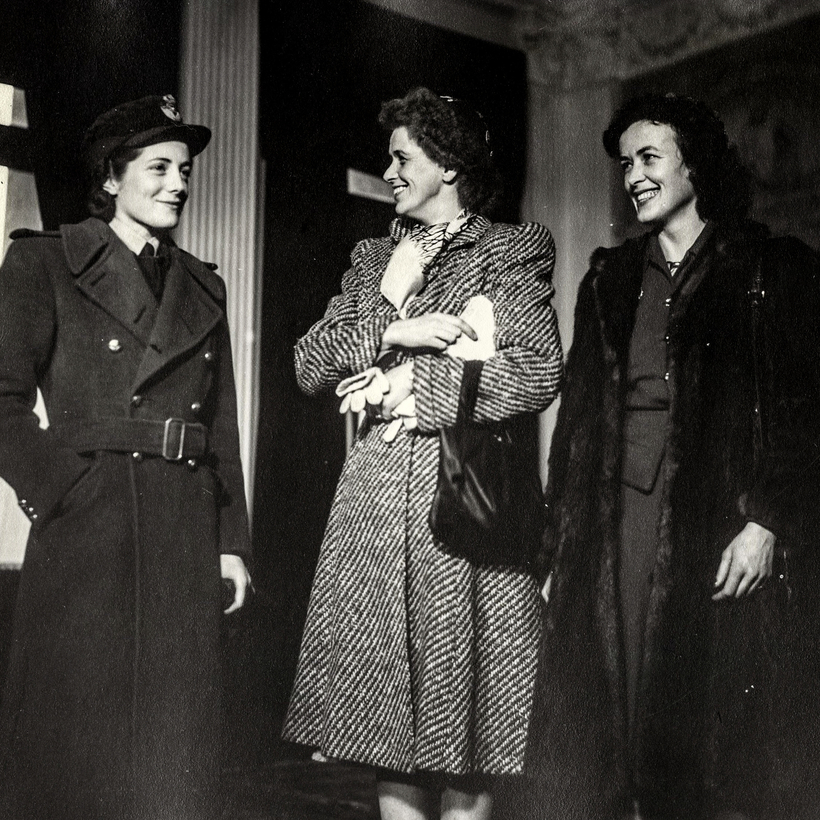On February 4, 1945, Franklin Roosevelt, Winston Churchill, and Joseph Stalin met for their final summit of World War II, the Yalta Conference. Among other key players of the day who accompanied the leaders was Averell Harriman, U.S. ambassador to the Soviet Union. Also in tow were three young women, each attending with a single brief: daughter. Anna Roosevelt Boettiger, 38, Kathleen Harriman, 27, and Sarah Churchill, 30, served as companions, hostesses, confidantes, and gatekeepers for their fathers.
Luckily, they also had time to write letters and diaries that give us their chatty, opinionated, off-the-record accounts of the proceedings. With these and many other sources, author Catherine Grace Katz skillfully guides us through the preparations, meetings, and aftermath of those eight days by the Black Sea.
Lavrentiy Beria, head of Stalin’s N.K.V.D., was in charge of preparations. He brought in thousands of P.O.W. laborers to repair buildings and hundreds of Soviet agents to expel “undesirables” from the area. He ordered up some 1,500 railway cars filled with luxuries and necessities commandeered from Moscow’s best hotels. Among his thoughtful gestures was the offer to Western delegates of “bed warmers,” young women available for their entertainment during diplomatic downtime. Plying his real trade, he also stocked the American residence with bugging devices, installing his own son in a secret room to listen in on F.D.R. day and night. A smiling Stalin called Beria “our Himmler.” Kathy Harriman called him “the most feared man” she had ever met.
The czarist palaces Beria readied were less than palatial after years of Soviet re-purposing and Nazi looting. Bedbugs and lice resisted heavy doses of DDT, and Churchill woke one morning with badly bitten feet. Only a few indoor bathrooms were available for scores of guests, resulting in long pre-dawn lavatory queues of military and diplomatic dignitaries. Men shaved in bedside buckets. Rooms were at a premium, with some high-ranking American officers bunking in together like G.I.’s in a barracks, 16 to a room. Churchill dubbed Yalta “the Riviera of Hades.”
Unlock Your Daughters
The daughters deftly navigated these crowded diplomatic waters. Sarah gave Churchill the comfort and understanding he needed as Britain’s imperial power faded and the once rock-steady support of F.D.R. tipped toward Stalin. She tucked him into bed every night.
For Averell Harriman, Kathy was a coolheaded aide-de-camp, equal to any assignment. Before the conference began, he delegated his site-inspection duties to her. She brought a sharp eye to the details, having F.D.R.’s bathroom repainted seven times so that its walls would “match the color of the water.” Later, when Averell told her to “get up” at Stalin’s 20-course banquet, she made a toast on behalf of the daughters in self-taught Russian.
F.D.R. seemed to pay little attention to Anna, but she was on a mission of her own. Apart from his doctor, no one but Anna—not even Roosevelt himself—knew his heart was failing. Anna was determined to guard both his strength and his secret. She ran interference with all visitors and tried to restrict his hours and his diet. Even so, Churchill’s doctor compared F.D.R.’s appearance to “an elderly Queen Victoria.”
Anna Roosevelt Boettiger, Kathleen Harriman, and Sarah Churchill served as companions, hostesses, confidantes, and gatekeepers for their fathers.
More complicated than any diplomatic negotiation was the tangled relationship of Averell and Kathy Harriman with Pamela Churchill, Winston’s daughter-in-law. During the Blitz, with all three in London, Pamela became Kathy’s best friend and Averell’s lover. Kathy knew what was going on but decided to preserve the friendship, even after Averell wrote to her from Washington instructing her to end the affair for him: “Help Pam straighten herself out—poor child.” Despite this caddishness, Pamela married the ancient Averell 26 years later. Excerpts from Kathy’s long letter to Pam from Yalta provide some of the book’s best insider commentary.
The conference itself was a game of Chutes and Ladders for the dynamic personalities of the Allied leaders. Through eight plenary sessions, they maneuvered their visions of the postwar world around the board. In the end, paper promises were made, difficult issues were passed along to committees for study, and only the military details for victory in Europe were truly settled. Even as we read, we know that Yalta was a failure, the opening skirmish of the Cold War. Yet, in Katz’s telling, we are caught up in the moment of unfolding details, relationships, and personalities of the daughters along for the ride.
Robin Olson is a Los Angeles–based writer and editor

